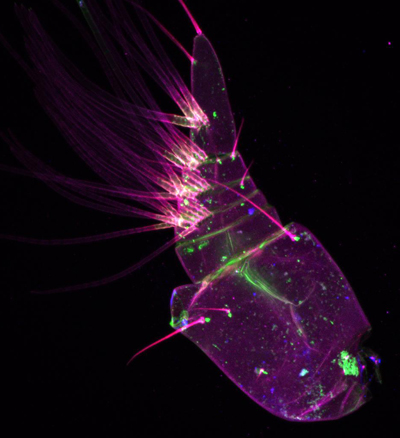Fast times at MBL
Posted by Andrew Mathewson, on 19 June 2012
Sitting down to write this reflection, it struck me that I couldn’t believe it has really been two weeks since I arrived in the quiet town of Woods Hole, MA for the Embryology course at the Marine Biological Laboratory (MBL). Time has become an abstract concept for my fellow students and me; it seems like we just got here and yet have known one another for months. We engage in science almost every hour of every day. There is no work – only play. I was imaging immunostained plankton on a new Nikon A1 confocal microscope at 3am Saturday morning. I would have gone all night except I did not want to miss Nipam Patel’s famous butterfly lecture at 9am the same morning. Again, this isn’t work. I want to be doing this – and so does everyone else here.
I don’t know what generates the enthusiasm and energy at the MBL. In my graduate lab back at the University of Washington I am a hard worker, yet I don’t have the inclination (or ability) to maintain the pace that I have picked up here. It is not uncommon to work in lab until 2 or 3am, and yet we all eagerly attend lectures a few hours later and put in another 15+ hour day, six or seven days a week. Perhaps it’s the access to the best scientific equipment around – the sheer quantity of reagents and quality of microscopes available to us is stunning. However, more likely it’s being removed for six weeks from my regular graduate school environment. There is no pressure to generate actual data during my time here, no PI to disappoint, no lab meetings to prepare, and certainly no time to read current papers (I’ll have a lot of catching up to do in August!). There is only active experimentation. I am encouraged to ask my own questions and take ridiculous risks. I can do what interests me, even if there is no apparent face value for my field. For example, I spent last week honing my antibody staining skills by asking the question, “What is the prettiest combination of antibodies one can use on Drosophila embryos?” At the same time there is enough structure to ensure that I am learning the principles of developmental biology at an alarming pace.
I am a student of molecular biology but fairly new to the field of development, so I initially worried that I would struggle to keep up with students who were already experienced in developmental biology. These worries were unfounded as we all have as varied scientific backgrounds as our countries of origin. As one of five Americans in our class of twenty-four, this experience has allowed me to discover the commonalities in the language of science. Our techniques and questions might be different, but our curiosity and passion is matched. We were told that we would form bonds that will last the rest of our careers here, and two weeks in, I have little doubt that this was the truth.
When we are not actively manipulating embryos, world-renowned scientists distill their experience into our exhausted minds. We absorb as much as we can and then teach them drinking games in the wee hours of the morning. We have learned how to operate multitudes of imaging systems and practiced performing essential experimental techniques on more organisms than most people experience in a lifetime. In just two weeks we have been immersed in the history and current research directions of several models of development, including sea urchin, C. elegans, Drosophila, and many other invertebrates. Each model brings with it new opportunities and excitement, as well as traditions and challenges.
As we make the transition to vertebrate models, I am glad to take this moment to pause and reflect on my experiences so far. Six weeks is a long time to step out of one’s graduate research (and not to mention one’s life). It’s hard to assess what this time will mean to me in the years to come as I continue my own research. But if I were able to continue to engage as fully with the science of life as I have these last two weeks, I would never look back.



 (15 votes)
(15 votes)
Great post Andrew! This really makes me wish I’d gone to the course when I was a student (or perhaps that I were still a student and could go now!)